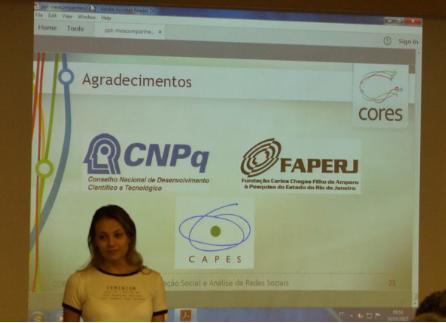At the 8th Semana da Integração Acadêmica, portuguese for Week of Academic Integration (SIAc-2017), in the subsection: Undergraduate Scientific Mentoring Journey (JIC), held at the Federal University of Rio de Janeiro (UFRJ) on October 24th, 2017. With the work “Me Acompanhe” (“Follow Me”, in portuguese) by the undergraduate student in Computer Science, Thamires Bessa. The project is a mobile application based on geolocation that aims to help women and trans people in the prevention of gender violence, and is being developed by mentorship of Professor Jonice Oliveira, head of the LabCORES and Professor of the Department of Computer Science (DCC / UFRJ), and the master in Informatics student and journalist, Fernanda Alves.
The application is part of the undergraduate conclusion work of Thamires Bessa and also composes Fernanda Alves master’s thesis on the use of georeferenced mobile devices in the fight against gender violence. The theme is relevant in the significant Brazilian statistics on gender violence, as exemplified by a recent survey by Datafolha (2017), in which one in three Brazilian women suffered some type of violence last year. Violence ranging from verbal abuse and sexual harassment to attempts at femicide and beatings. Countries with high levels of gender violence have presented research and technological projects that help combat and change this reality.
The Cores lab has a history of research in projects and social impact projects that propose reflection on cities and technologies, and also has students of interdisciplinary areas who actively collaborate for researches like this. According to Thamires Bessa who presented the project “Me Acompanhe” during the JIC, “it is amazing to be able to take part in a project that can help thousands of women across the country. We know we are going to learn a lot at the University and that studying will shape our careers but when you see you are able to apply the knowledge you have acquired into practice, into something that can make people feel and be safer, all I can feel is that I’ve done the right choice.”
The application is being developed by women students who work in fields that still have a male majority, it also express the laboratory’s sensitivity and commitment to gender equity and progressive guidelines for science and society. As Thamires concludes “this project is another step towards a better place for women, towards a place where gender will not be an issue. Presenting the project for an audience (majority of men) was a little bit of a challenge because the most important subject was to make them understand why we need the app and get them to see how deep the sexism problem goes. Still, it was great to be there and show them our work, dedication and will to make a positive change in the world.”
